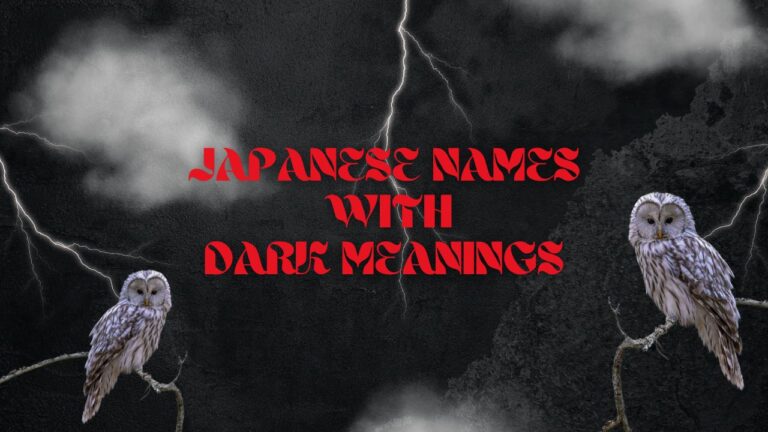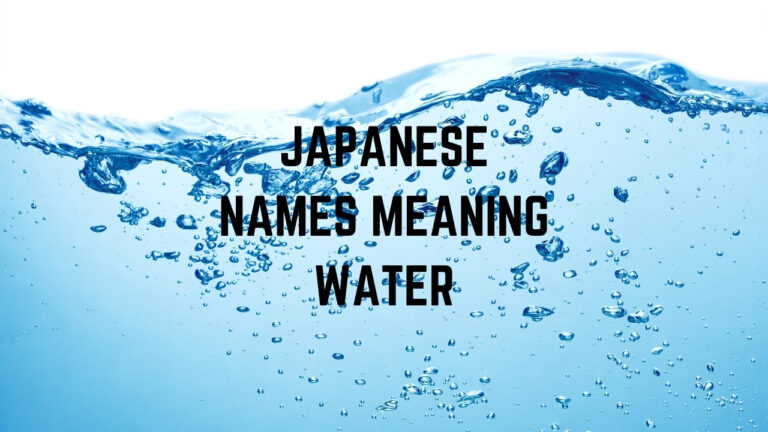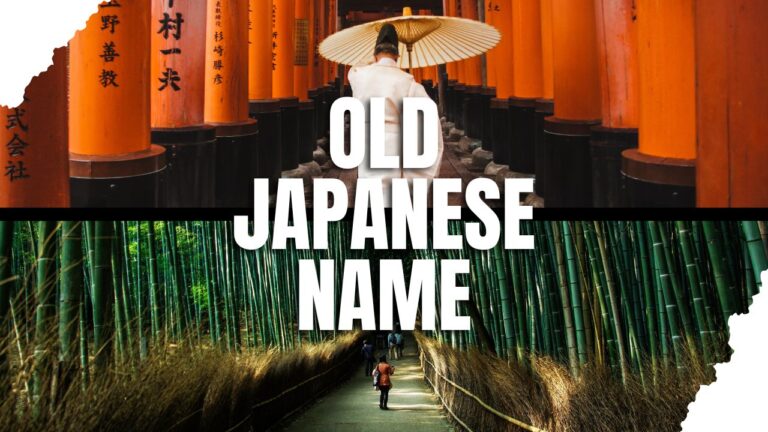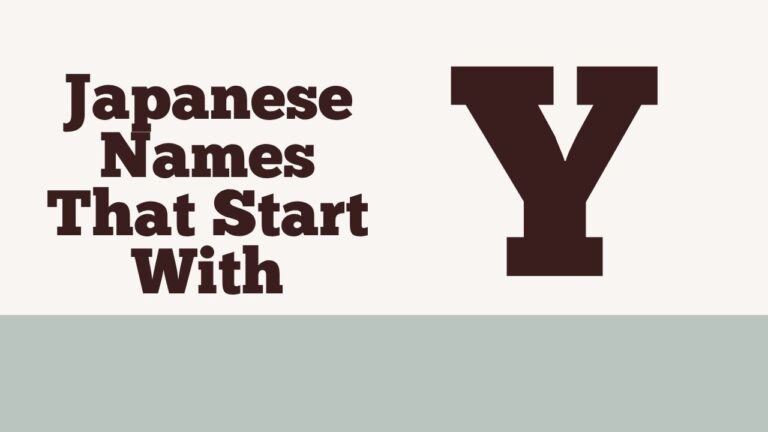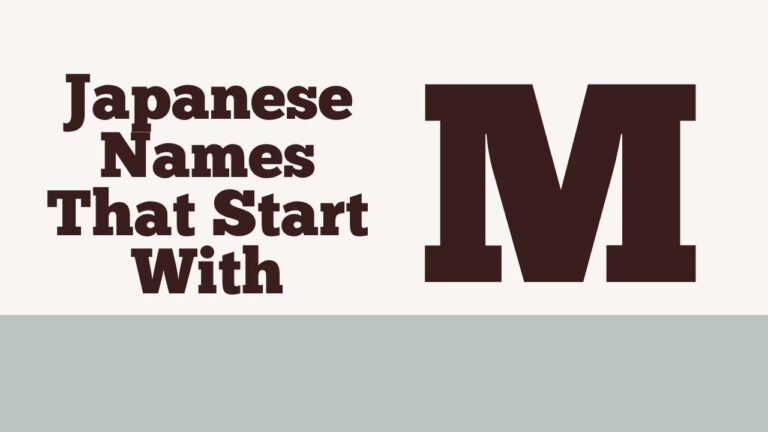Rare Japanese Last Names: 150+ Unique and Historical Names
Japan has a long history filled with tradition, and its surnames often reflect that rich cultural depth. While many are familiar with common family names, there are also rare Japanese last names that carry hidden stories, deep meanings, and even mysterious or dark origins.
Some of these names are tied to ancient clans, making them feel almost like royal Japanese surnames, while others stand out for being truly one of a kind. In this article, we’ll explore unique Japanese last names—from those with ancient roots to Japanese last names with dark meanings.
Whether you’re interested in rare Japanese last names male or looking for rare Japanese last names girl, this guide will introduce you to some of the most fascinating and uncommon family names in Japan.
Also Read:110+ pretty Japanese names
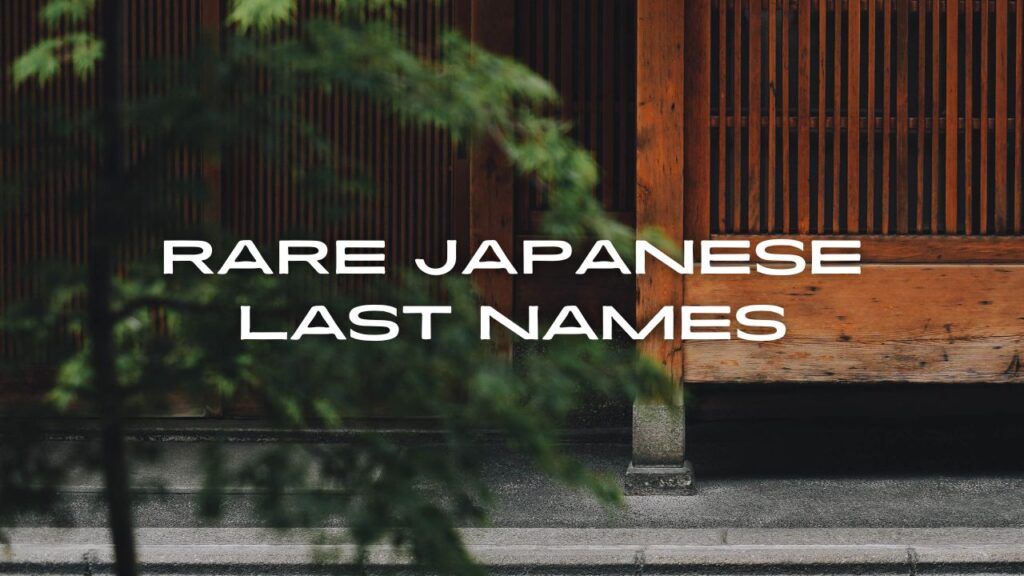
Rare Japanese Unisex Last Names
- 氷室 (Himuro) – “Ice room” or “ice chamber”; often linked to cold storage in ancient times.
- 雨森 (Amemori) – “Rain forest”; evokes images of deep, misty woodlands.
- 風間 (Kazama) – “Wind gap” or “between winds”; poetic and mysterious.
- 花園 (Hanazono) – “Flower garden”; associated with beauty and elegance.
- 黒川 (Kurokawa) – “Black river”; often represents mystery or depth.
- 時雨 (Shigure) – “Late autumn rain” or “drizzle”; a seasonal poetic term.
- 月岡 (Tsukioka) – “Moon hill”; symbolic of serenity and night.
- 星野 (Hoshino) – “Field of stars”; dreamy and celestial.
- 森永 (Morinaga) – “Eternal forest”; linked to longevity and nature.
- 雪村 (Yukimura) – “Snow village”; evokes calmness and winter scenes.
- 霞沢 (Kasumizawa) – “Misty marsh”; rare and poetic in nature.
- 真壁 (Makabe) – “True wall”; suggests strength and honesty.
- 桜庭 (Sakuraba) – “Cherry blossom garden”; very seasonal and elegant.
- 光石 (Mitsuishi) – “Shining stone”; represents brilliance and resilience.
- 秋津 (Akitsu) – Old name for dragonfly; symbolic in Japanese mythology.
- 青野 (Aono) – “Blue field”; calm, open, and rare in real usage.
- 日下部 (Kusakabe) – “Below the sun”; an ancient noble family name.
- 夜久 (Yaku) – “Night eternity”; mysterious and almost poetic.
- 影山 (Kageyama) – “Shadow mountain”; often linked to secretive strength.
- 竹内 (Takeuchi) – “Within bamboo”; denotes peace and flexibility.
- 霧島 (Kirishima) – “Island of mist”; also a volcanic region in Japan.
- 琴平 (Kotohira) – “Heavenly harp flatland”; spiritual and musical.
- 砂原 (Sunahara) – “Sandy plain”; linked to nature and landscape.
- 蒼月 (Aotsuki) – “Blue moon”; extremely rare and artistic.
- 龍田 (Tatsuta) – “Dragon field”; carries mythological strength.
Rare Japanese Male Last Names
- 猿渡 (Saruwatari) – “Monkey crossing”; rare and found in Kyushu regions.
- 神楽坂 (Kagurazaka) – “Sacred music hill”; connected to Shinto rituals and ancient culture.
- 伊集院 (Ijuin) – “Temple of the Iju clan”; historically noble and very uncommon.
- 賀来 (Kaku) – “Joy arrival”; noble and rooted in old family lineages.
- 早乙女 (Saotome) – Originally meant “young maiden,” but used as a strong samurai family name.
- 馬渕 (Mabuchi) – “Horse riverbed”; related to strength and travel.
- 大鳥 (Ōtori) – “Large bird”; symbolic of power and grace.
- 篠原 (Shinohara) – “Bamboo meadow”; often seen in old rural families.
- 秋月 (Akizuki) – “Autumn moon”; poetic and linked to ancient clans.
- 石倉 (Ishikura) – “Stone warehouse”; sturdy and rare.
- 津村 (Tsumura) – “Harbor village”; uncommon in modern-day records.
- 十文字 (Jūmonji) – “Cross shape”; associated with samurai and sword styles.
- 香取 (Katori) – “Fragrance bird”; has ties to shrines and noble families.
- 飛鳥井 (Asukai) – “Flying bird well”; once used by court nobles.
- 福冨 (Fukutomi) – “Wealthy fortune”; linked to old merchants or nobility.
- 真田 (Sanada) – “True rice field”; famous but rare surname of a samurai clan.
- 青嶋 (Aoshima) – “Blue island”; unusual and beautiful nature-based name.
- 宇都宮 (Utsunomiya) – “Shrine of the heavens”; has aristocratic background.
- 姫川 (Himekawa) – “Princess river”; more common as a given name, rare as a surname.
- 海藤 (Kaidō) – “Ocean wisteria”; extremely rare and poetic.
- 榊原 (Sakakibara) – “Sacred tree field”; ancient warrior name.
- 剣崎 (Kenzaki) – “Sword cape”; very rare, found in fiction and old samurai records.
- 斑目 (Madara) – “Speckled eye”; highly rare, appears in fictional characters.
- 加賀美 (Kagami) – “Beautiful Kaga (province)”; noble and elegant.
- 雁屋 (Ganiya) – “Wild goose house”; rare and poetic in tone.
Rare Japanese Female Last Names
- 白鳥 (Shiratori) – “White bird” or “swan”; symbolizes purity and grace.
- 花村 (Hanamura) – “Flower village”; soft, gentle, and poetic.
- 夕霧 (Yūgiri) – “Evening mist”; romantic and rare, often found in historical fiction.
- 小夜 (Sayo) – “Little night”; poetic and feminine in tone.
- 美波 (Minami) – “Beautiful wave”; elegant and nature-inspired.
- 香山 (Kayama) – “Fragrant mountain”; delicate and used in traditional poetry.
- 彩瀬 (Ayase) – “Colorful shallows”; artistic and modern-sounding but rare.
- 瑞穂 (Mizuho) – “Fresh ears of rice”; symbolizes fertility and gentleness.
- 春乃 (Haruno) – “Spring field”; seasonal and soft, evokes natural beauty.
- 音無 (Otonashi) – “Silent sound”; rare and deeply poetic.
- 花崎 (Hanasaki) – “Blossoming flowers”; often used in stories involving noble women.
- 桃原 (Momohara) – “Peach field”; feminine and symbolic of spring.
- 野々村 (Nonmura) – “Field village”; a gentle rural surname.
- 夢前 (Yumesaki) – “Before the dream”; rare, symbolic, and dreamlike.
- 朝霧 (Asagiri) – “Morning mist”; elegant and naturally beautiful.
- 水嶋 (Mizushima) – “Water island”; graceful and uncommon.
- 花井 (Hanai) – “Flower well”; represents beauty and softness.
- 雪乃 (Yukino) – “Child of snow”; very gentle and poetic.
- 月影 (Tsukikage) – “Moonlight shadow”; mysterious and lyrical.
- 絹川 (Kinugawa) – “Silk river”; elegant and luxurious sounding.
- 藤咲 (Fujisaki) – “Wisteria bloom”; associated with noble women in literature.
- 小笠原 (Ogasawara) – Old noble family name, historically tied to etiquette and refinement.
- 桐山 (Kiriyama) – “Paulownia tree mountain”; rare and symbolic of noble beauty.
- 菊池 (Kikuchi) – “Chrysanthemum pond”; tied to the imperial flower of Japan.
- 白峰 (Shirane) – “White peak”; peaceful and tied to mountain beauty.
Rare Japanese Cultural Last Names
- 能登 (Noto) – 能 (Nō, traditional drama) + 登 (to climb); linked to classical performing arts.
- 香取神 (Katorigami) – “Divine fragrance”; tied to Shinto shrines and rituals.
- 絵馬 (Ema) – “Votive picture tablet”; linked to shrine customs where wishes are written.
- 雅楽 (Gagaku) – “Elegant music”; traditional court music, rare as a surname.
- 石舞台 (Ishibutai) – “Stone stage”; related to ancient tombs and performance.
- 白拍子 (Shirabyōshi) – Female court dancers in Heian era; surname used in old scripts.
- 漆原 (Urushibara) – “Lacquer field”; connected to urushi (Japanese lacquerware).
- 藍沢 (Aizawa) – “Indigo stream”; linked to traditional Japanese dyeing techniques.
- 陶山 (Suyama) – “Pottery mountain”; derived from traditional ceramic families.
- 竹取 (Taketori) – “Bamboo cutter”; inspired by Taketori Monogatari, Japan’s oldest tale.
- 舞坂 (Maisaka) – “Dance slope”; related to ceremonial dance traditions.
- 筆山 (Fudeyama) – “Brush mountain”; linked to calligraphy and ink painting.
- 酒井戸 (Sakaido) – “Sake well”; associated with sake brewing culture.
- 紙谷 (Kamidani) – “Paper valley”; connected to washi (traditional Japanese paper).
- 稲荷田 (Inarita) – “Field of Inari deity”; culturally tied to rice and fox worship.
- 布施川 (Fusegawa) – “Offering river”; associated with Buddhist charity (fuse).
- 榊谷 (Sakakitani) – “Sacred tree valley”; used in Shinto rituals.
- 鐘堂 (Kanedō) – “Bell hall”; tied to Buddhist temple architecture.
- 人形町 (Ningyōchō) – “Doll town”; a historical Edo district known for puppet arts.
- 祭野 (Matsurino) – “Festival field”; evokes imagery of matsuri (Japanese festivals).
- 歌島 (Utashima) – “Song island”; related to traditional poetry and folklore.
- 神楽田 (Kagurada) – “Field of sacred music”; associated with Shinto ceremonial dances.
- 絹田 (Kinuta) – “Silk field”; symbolic of Japan’s textile traditions.
- 影能 (Kagenō) – “Shadow performance”; poetic name tied to classical theater.
- 文京 (Bunkyō) – “Literature capital”; represents scholarly and cultural refinement, also a historic name.
Rare Japanese Spiritual Last Names
- 神谷 (Kamiya) – “Valley of the gods”; often linked to Shinto shrines or sacred locations.
- 仏坂 (Butsubaka) – “Buddha slope”; symbolic of enlightenment or pilgrimage paths.
- 天海 (Amami) – “Heavenly sea”; evokes spiritual calm and divine expanse.
- 霊沢 (Reitaku) – “Spiritual spring”; believed to be blessed or sacred water.
- 祝田 (Iwaida) – “Field of blessings”; related to Shinto rituals and sacred offerings.
- 法林 (Hōrin) – “Forest of dharma/law”; reflects Buddhist doctrine and peace.
- 巫女田 (Mikota) – “Field of shrine maidens”; connected to female spiritual figures in Shinto.
- 空閑 (Kuga) – “Silent sky/emptiness”; Buddhist-leaning name tied to Zen concepts.
- 八雲 (Yakumo) – “Eight clouds”; mythical and spiritual, appears in Shinto myths.
- 大祓 (Ōharae) – “Great purification”; associated with important Shinto cleansing rituals.
- 神尾 (Kamio) – “Divine tail/end”; poetic and sacred tone, used in priestly lineages.
- 観音寺 (Kannonji) – “Temple of Kannon (goddess of mercy)”; sacred and symbolic.
- 魂田 (Tamashita) – “Soul field”; mysterious and deeply spiritual in origin.
- 夢神 (Yumegami) – “Dream god”; rare and mystic, used symbolically in folklore.
- 禅野 (Zenya) – “Zen field”; connected to meditation and Buddhist purity.
- 霊山 (Reizan) – “Spirit mountain”; often sacred grounds or pilgrimage spots.
- 神名 (Jinna) – “Divine name”; subtle but powerful spiritual reference.
- 仏生 (Busshō) – “Birth of Buddha”; highly rare and religiously symbolic.
- 浄光 (Jōkō) – “Pure light”; used in temples or spiritual lineages.
- 天照 (Amateru) – Related to Amaterasu, the sun goddess; divine lineage.
- 祭宮 (Matsurimiya) – “Festival shrine”; linked to worship and spiritual celebration.
- 悟野 (Satono) – “Field of enlightenment”; symbolic of wisdom and inner peace.
- 誓川 (Chikagawa) – “Vow river”; possibly related to spiritual pledges or rituals.
- 魂橋 (Tamahashi) – “Soul bridge”; mythologically symbolic of passage to afterlife.
- 法善 (Hōzen) – “Dharma goodness”; reflects moral and spiritual uprightness.
Rare Japanese Royal Last Names
- 源 (Minamoto) – One of the four noble clans of the Heian era; directly tied to the imperial family.
- 平 (Taira) – Rival clan of the Minamoto; established by an emperor’s descendants.
- 藤原 (Fujiwara) – A powerful court family that dominated politics for centuries.
- 北畠 (Kitabatake) – A noble family from the Muromachi period, linked to the Southern Court.
- 九条 (Kujō) – One of the five regent houses (go-sekke), descending from the Fujiwara clan.
- 一条 (Ichijō) – Another regent family, closely tied to the imperial court.
- 西園寺 (Saionji) – Influential aristocratic family involved in politics and education.
- 徳大寺 (Tokudaiji) – Noble family known for cultural contributions, especially poetry.
- 中御門 (Nakamikado) – Surname of an imperial family branch and also a historical emperor.
- 勅使河原 (Teshigawara) – “Imperial envoy river field”; associated with court missions.
- 有栖川 (Arisugawa) – An imperial branch family with military and diplomatic roles.
- 高倉 (Takakura) – Name of an emperor and noble lineage; implies “high storehouse.”
- 賀茂 (Kamo) – Ancient noble family tied to Shinto priesthood at the Kamo Shrine.
- 五摂家 (Gosekke) – A collective name for the five top regent families; used symbolically.
- 山科 (Yamashina) – Noble family with imperial roots; often used as a court title.
- 醍醐 (Daigo) – Linked to Emperor Daigo and the Daigo-ji Temple lineage.
- 二条 (Nijō) – One of the five regent families; closely tied to classical court life.
- 冷泉 (Reizei) – Noble family known for preserving waka poetry traditions.
- 常盤 (Tokiwa) – Noble name meaning “everlasting”; linked to court ladies and legends.
- 六条 (Rokujō) – Aristocratic surname often found in Heian period poetry circles.
- 三条 (Sanjō) – Noble surname used in both court and government ranks.
- 滋野 (Shigeno) – An old noble family tied to ancient Yamato royalty.
- 春日 (Kasuga) – Refers to the Kasuga shrine family, deeply tied to the Fujiwara clan.
- 清原 (Kiyohara) – Scholarly noble family from early Japanese history.
- 安倍 (Abe) – Ancient noble clan with long-standing political and military influence.
Rare Japanese Last Names with Dark Meanings
- 黒崎 (Kurosaki) – “Black cape” or “dark promontory”; often symbolizes shadowy or tragic fate.
- 墓谷 (Hakatani) – “Grave valley”; rare and directly related to burial or mourning.
- 死神田 (Shinigamida) – “Field of the death god”; fictional but found in darker media and games.
- 呪野 (Noroya) – “Cursed field”; linked to folklore and rural superstitions.
- 闇坂 (Yamizaka) – “Darkness hill”; ominous, symbolic of struggle or unknown forces.
- 鬼頭 (Onitō) – “Demon head”; suggests demonic ancestry or fierceness.
- 獄谷 (Gokutani) – “Prison valley” or “hell valley”; harsh imagery, often tied to war-torn areas.
- 屍山 (Shizan) – “Corpse mountain”; mythical, symbolic of battlefield death.
- 血原 (Chihara) – “Blood field”; a surname found in horror and supernatural genres.
- 魔野 (Mano) – “Demon field”; extremely rare, used in fantasy and horror.
- 影森 (Kagemori) – “Shadow forest”; hidden, eerie, and silent.
- 毒島 (Busujima) – “Poison island”; unsettling tone, often appears in dark fiction.
- 黒火 (Kurobi) – “Black fire”; symbolic of destructive power or cursed flames.
- 黄泉田 (Yomida) – “Field of the underworld”; Yomi refers to the land of the dead in Shinto.
- 夜刀 (Yatō) – “Night blade”; sharp, dangerous, and darkly elegant.
- 隠神 (Onigami) – “Hidden god”; mysterious, divine yet unsettling.
- 死川 (Shikawa) – “River of death”; symbolic of crossing into the afterlife.
- 惨田 (Migita) – “Cruel field”; a poetic yet disturbing surname, rarely seen.
- 骸谷 (Mukaiya) – “Valley of corpses”; symbolic of forgotten or cursed places.
- 亡月 (Nakazuki) – “Dead moon”; melancholic and eerie, often symbolic of endings.
- 瘴原 (Shōbara) – “Miasma plain”; toxic, unhealthy, linked to old superstition.
- 冥道 (Meidō) – “Path to the underworld”; from Buddhist cosmology, symbolizing death’s journey.
- 影沼 (Kagenuma) – “Shadow swamp”; mysterious, eerie, and silent.
- 滅火 (Metsuka) – “Extinguished fire”; symbolic of death, defeat, or loss of will.
- 虚見 (Urokami) – “False vision” or “illusion sight”; spiritually dark and delusive.
Rare Japanese Historical Last Names
- 南部 (Nanbu) – Once a powerful clan in northern Honshu; known for horse breeding and ironwork.
- 結城 (Yūki) – A branch of the Fujiwara clan; prominent during the Kamakura and Muromachi periods.
- 最上 (Mogami) – Daimyō family in Dewa Province; known for its strategic alliances and internal conflict.
- 長宗我部 (Chōsokabe) – Feared clan from Shikoku; known for unifying Tosa Province.
- 佐竹 (Satake) – Samurai family from Hitachi Province; known for resisting Tokugawa centralization.
- 細川 (Hosokawa) – A prominent warlord family; held strong influence during the Muromachi period.
- 秋月 (Akizuki) – Retainer clan in Kyushu; involved in the Sengoku and early Edo periods.
- 尼子 (Amago) – A powerful clan from Izumo; known for its fierce rivalry with the Mōri clan.
- 椎名 (Shiina) – A minor yet strategic clan in Echigo Province; allies of Uesugi Kenshin.
- 山内 (Yamauchi) – Known for ruling Tosa under the Tokugawa regime; influential during the Edo period.
- 京極 (Kyōgoku) – One of the oldest noble families; held court ranks and lands in Omi Province.
- 毛野 (Keno) – Rare and archaic surname tied to early Yamato period court families.
- 岡部 (Okabe) – A samurai family that served the Imagawa and later the Tokugawa clans.
- 片倉 (Katakura) – Loyal retainers of the Date clan; known for their bravery and military skill.
- 真壁 (Makabe) – Retainers of the Satake clan; active during the Sengoku period.
- 水野 (Mizuno) – Tokugawa allies from Mikawa Province; some members became daimyō.
- 北条 (Hōjō) – Though the later Hōjō were more famous, several lesser branches carried this name.
- 稲富 (Inatomi) – Known for introducing advanced firearms tactics in the Sengoku era.
- 堀秀 (Horihide) – Vassals of Toyotomi Hideyoshi; engaged in the Korean invasions.
- 三好 (Miyoshi) – A powerful warlord clan during the Sengoku period; ruled over parts of Kansai.
- 筒井 (Tsutsui) – Based in Yamato Province; rivals and later allies of the Oda clan.
- 松浦 (Matsuura) – Naval clan from Hizen Province; involved in trade and pirate suppression.
- 宗 (Sō) – Lords of Tsushima Island; key in managing trade and diplomacy with Korea.
- 長井 (Nagai) – Served under Uesugi Kenshin; known for military administration.
- 伊東 (Itō) – Controlled parts of Hyūga Province; involved in struggles against the Shimazu.
conclusion
Japanese surnames carry deep meaning, and exploring the rare ones—especially those tied to history and darker themes—offers a unique glimpse into Japan’s cultural and emotional depth.
These last names are more than just identifiers; they reflect centuries of struggle, legacy, and belief. Whether drawn from ancient clans, war-torn eras, or spiritual symbolism, each name tells a story that connects the past to the present.
By understanding these lesser-known names, we not only appreciate the richness of Japanese heritage but also uncover the forgotten voices behind them.

